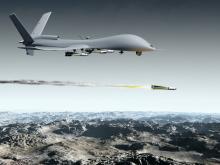drones

Star Trek: Into Darkness is a fascinating and complicated story that is well worth watching. Instead of providing a summary, I want to explore three related aspects of the movie: sacrifice, blood, and hope for a more peaceful future.
Live Long and Prosper – The Sacrificial Formula
In a reference to my favorite Star Trek movie, Star Trek II: The Wrath of Khan, the current movie’s Spock (Zachary Quinto) restates the sacrificial formula: “The needs of the many outweigh the needs of the one.” This formula has generally been used throughout human history to justify sacrificing someone else. As René Girard points out, from ancient human groups to modern societies, whenever conflicts arise the natural way to find reconciliation is to unite against a common enemy.
Of course, there’s a lot of this going on throughout the Star Trek franchise. One conversation in Into Darkness explicitly points this out when Kirk (Chris Pine) unites with his enemy Khan (Benedict Cumberbatch), and explains it to Spock:
Kirk: The enemy of my enemy is my friend.
Spock: An Arabic proverb attributed to a prince who was betrayed and decapitated by his own subjects.
Kirk: Well, it’s still a hell of a quote.
JEREMY SCAHILL SPENT years working out his notions of social justice in homeless shelters and conflict zones and among peace activists. In 2007, Scahill’s award-winning investigative reporting made waves when he published Blackwater: The Rise of the World's Most Powerful Mercenary Army, a comprehensive exposé on the secret role of private military contractors in the United States’ “war on terror,” which prompted several congressional inquiries. Scahill’s newest book, Dirty Wars: The World is a Battlefield, digs into the obscure underbelly of U.S. covert wars.
“In one of my trips to Yemen, I traveled in the south of the country where most of the U.S. drone strikes in Yemen have happened,” Scahill said during a recent visit to Sojourners’ Washington, D.C. office. “I was interviewing a number of tribal leaders. This guy from Shabwa province said to me, ‘[Americans] consider al Qaeda [to be] terrorism. We consider your drones [to be] terrorism.’ I heard that over and over in a variety of countries. ... Many people, in Yemen or in Somalia, would not be predisposed to think of al Qaeda as anything positive. Al Qaeda is a reviled organization in Yemen. ... But there are tribal leaders who are saying, ‘You know, you pushed us into a corner where our people are now sympathetic with al Qaeda.’ After years of traveling in these countries, I really believe that we’re creating more enemies than we’re killing.”
In some respects, drones are simply a new tool of old empire. Scahill’s book title, Dirty Wars (and film of the same name), is partly “a macabre tip-of-the-hat to the dirty wars in Central America, fueled by the United States ... targeting people who are insurgents and claiming they were communists. The new version of this is targeting people who are fighting us and claiming they’re al Qaeda.”
ON THE AFTERNOON of Dec. 14, President Obama stood in the White House press room, tears in his eyes, and spoke for many Americans who had watched the terrifying events unfolding in Newtown, Conn.
“I know there’s not a parent in America who doesn’t feel the same overwhelming grief that I do. The majority of those who died today were children: beautiful little kids between the ages of 5 and 10 years old,” he said. “They had their entire lives ahead of them—birthdays, graduations, weddings, kids of their own.”
A little more than a month later, on Jan. 23, a pilotless aircraft owned and operated by the United States and controlled remotely by an individual on U.S. soil launched a targeted attack on the riders of two motorcycles in Yemen. The attack missed its target. It hit the house of Abdu Mohammed al-Jarrah instead, killing several people—including al-Jarrah’s two children.
There was no press conference for the al-Jarrah children.
It was President Obama himself, in fact, after his inauguration in 2009, who authorized an expansion of the U.S. drone program launched under George W. Bush. The “Authorization for Use of Military Force,” passed shortly after Sept. 11, gives the president broad authority to use force against those involved in the 9/11 attacks or those who harbor them. Drones have become President Obama’s weapon of choice.

SOME CHRISTIANS seeking moral guidance about drone warfare find enough clear teaching in Jesus’ command to love our enemies and respond to conflict with principled, active nonviolence. Other Christian traditions, seeking to restrict and limit warfare, have developed principles of “just war,” which deem certain acts of war immoral and illegitimate. Targeted killings by drones, which have become key elements of the Obama administration’s counterterrorism strategy, fail the test of morality on a number of grounds:
1. Targeted assassinations outside of legally declared wars violate international law, which prohibits a country from carrying out military attacks in or against the territory of countries with which it is not at war. Drone attacks in Pakistan, Yemen, and Somalia violate this prohibition.
2. They violate the sovereignty of other countries. The government of Pakistan has repeatedly objected to drone strikes on its territory, calling them a “clear violation of our sovereignty and a violation of international law,” but its concerns have been repeatedly ignored.
3. There is little transparency or accountability. CIA drones are remotely controlled, primarily from Air Force bases in the United States, with no clear accountability, and with the targeting sometimes based on dubious intelligence.
LIBERTY UNIVERSITY in Lynchburg, Va., was founded by televangelist Jerry Falwell. Its publications carry the slogan “Training Champions for Christ since 1971.” Some of those champions are now being trained to pilot armed drones, and others to pilot more traditional aircraft, in U.S. wars. For Christ.
Liberty bills itself as “one of America’s top military-friendly schools.” It trains chaplains for the various branches of the military. And it trains pilots in its School of Aeronautics (SOA)—pilots who go up in planes and drone pilots who sit behind desks wearing pilot suits. The SOA, with more than 600 students, is not seen on campus, as it has recently moved to a building adjacent to Lynchburg Regional Airport.
Liberty’s campus looks new and attractive, large enough for some 12,000 students, swarming with blue campus buses, and heavy on sports facilities for the Liberty Flames. A campus bookstore prominently displays Resilient Warriors, a book by Associate Vice President for Military Outreach Maj. Gen. (Ret.) Robert F. Dees. There’s new construction everywhere you look: a $50 million library, a baseball stadium, new dorms, a tiny year-round artificial ski slope on the top of a hill. In fact, Liberty is sitting on more than $1 billion in net assets.
The major source of Liberty’s money is online education. There are some 60,000 Liberty students you don’t see on campus, because they study via the internet. They also make Liberty the largest university in Virginia, the fourth largest online university anywhere, and the largest Christian university in the world.
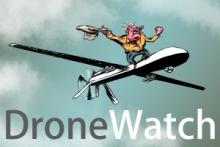
Six British Christian peace activists were arrested and detained for 24 hours for protesting at the RAF base from which British drones in Afghanistan are controlled. It is the first anti-drone protest in the U.K. to result in arrests. Ekklesia reports:
Six peace activists, representing the group Disarm the Drones, have become the first in Britain to be arrested and charged for anti-drones related offences. The nonviolent peace activists managed to breach security at Britain’s top security drone control base in Lincoln.
The six, who are Christian peace campaigners, planted a peace garden in RAF Waddington yesterday morning (3 June 2013). They also displayed images of the victims of drone attacks and may have located the precise place where UK attacks are programmed.
Read more here.
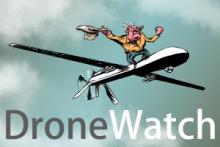
In what was largely a formality following last month’s popular elections, Pakistan’s parliament yesterday elected Nawaz Sharif as prime minister. In Mr. Sharif’s first speech, he said that he wanted better relations with the U.S., but included among his priorities an end to drone strikes. According to the Associated Press:
"This daily routine of drone attacks, this chapter shall now be closed," Sharif said to widespread applause in the parliament hall. "We do respect others' sovereignty. It is mandatory on others that they respect our sovereignty."
But he gave few details on how he might end the strikes. Many in Pakistan say the strikes kill large numbers of innocent civilians — something the U.S. denies — and end up breeding more extremism by those seeking retribution with the U.S.
Read more here.
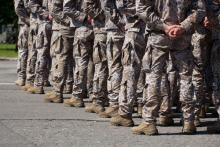
In his remarks at the National Defense University two weeks ago, President Obama stopped just one sentence short of declaring an end to the so-called “war on terror.” This is and always was a misnomer. It is a category error. A “war on terror” cannot be fought with armies and weapons of warfare. Terror is a response. Terrorism is a tactic. A terrorist is a criminal who ought to be apprehended, tried, and if convicted punished through the criminal justice system.
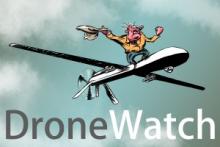
Akbar Ahmed, Islamic Studies chair at American University, writes in the New York Times this morning about the effect of both violent extremist groups and U.S. drone strikes on traditional tribal societies.
Drone strikes like Wednesday’s, in Waziristan, are destroying already weak tribal structures and throwing communities into disarray throughout Pakistan’s tribal belt along the border with Afghanistan. The chaos and rage they produce endangers the Pakistani government and fuels anti-Americanism. And the damage isn’t limited to Pakistan. Similar destruction is occurring in other traditional tribal societies like Afghanistan, Somalia and Yemen. The tribes on the periphery of these nations have long struggled for more autonomy from the central government, first under colonial rule and later against the modern state. The global war on terror has intensified that conflict.
…
In recent decades, these societies have undergone huge disruptions as the traditional leadership has come under attack by violent groups like the Taliban, Al Qaeda in the Arabian Peninsula and Somalia’s Al Shabab, not to mention full-scale military invasions. America has deployed drones into these power vacuums, causing ferocious backlashes against central governments while destroying any positive image of the United States that may have once existed.
Read more here.
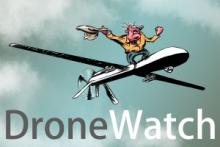
A spokesman for the Pakistani Taliban confirmed that Waliur Rehman, the group’s second-in-command, was killed in yesterday’s drone strike. Ahsanullah Ahsan also announced that an offer to begin peace talks with the new Pakistani government was being withdrawn.The Associated Press reports:
The militant group had said earlier that it was open to peace talks. But Ahsan said Thursday that the Taliban believe the government approves of the drone strikes so they are withdrawing their offer of peace talks.
"We had made the offer for peace talks with the government with good intention but we think that these drone attacks are carried out with the approval of the government so we announce the end of the talks process," he said.
The incoming government, headed by Nawaz Sharif, promised in the campaign that it would work to bring about peace after years of violence. A U.S. drone has now called that into doubt.
Read more here.
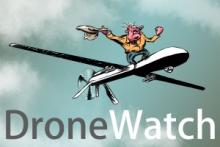
In the news this morning are reports of a U.S. drone strike in Pakistan that killed seven people, including the unconfirmed death of the number two leader of Pakistan’s Taliban. It is the first strike since Pakistan’s election, and the first since President Obama’s speech last week on drone policy. Reuters reports:
A U.S. drone strike killed the number two of the Pakistani Taliban in the North Waziristan region on Wednesday, three security officials said, in what would be a major blow in the fight against militancy.
The drone strike killed seven people, Pakistani security officials said, including Taliban deputy commander Wali-ur-Rehman, in the first such attack since a May 11 general election in which the use of the unmanned aircraft was a major issue.
Wali-ur-Rehman had been poised to succeed Hakimullah Mehsud as leader of the Pakistani Taliban, a senior army official based in the South Waziristan region, had said in December.
Read more here.
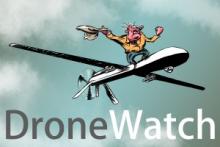
News reports over the weekend had Pakistani reactions to President Obama’s Thursday speech on drones.
DAWN reported a statement from the Pakistani Foreign Office:
The Government of Pakistan has consistently maintained that the drone strikes are counter-productive, entail loss of innocent civilian lives, have human rights and humanitarian implications and violate the principles of national sovereignty, territorial integrity and international law.
The Associated Press reported that while Pakistanis welcomed the speech and its more restrictive rules on drone strikes, there was also disappointment that strikes will continue:
Obama has finally responded to the popular sentiment in this country, which is fiercely against the drones, and I think that shows a certain sensitivity," said Mushahid Hussain, chairman of the defense committee in Pakistan's Senate. "But for the people of Pakistan that is not good enough unless there is a cessation of drone attacks."
Several Pakistani officials and analysts noted that the President’s comments could help in improving relations between the U.S. and the new government in Pakistan.
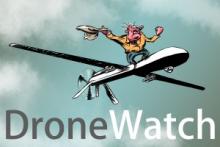
Saying that drone killings were “effective” and “legal,” President Barack Obama defended the program in a policy speech this afternoon at the National Defense University. He also conceded that “To say a military tactic is legal, or even effective, is not to say it is wise or moral in every instance.”
The administration, he said, has “worked vigorously to establish a framework that governs our use of force against terrorists—insisting upon clear guidelines, oversight and accountability that is now codified in Presidential Policy Guidance that I signed yesterday.” He did not go into specific detail, but indicated it included more restrictive targeting criteria along with measures to prevent civilian casualties (“before any strike is taken, there must be near-certainty that no civilians will be killed or injured.”)
The president said that “the use of force must be seen as part of a larger discussion about a comprehensive counter-terrorism strategy. Because for all the focus on the use of force, force alone cannot make us safe.” And as an important part of that strategy, “we must help countries modernize economies, upgrade education, and encourage entrepreneurship.”
Over the next days and weeks, we will certainly learn more, and we will see what happens on the ground.
Read reports on the speech in The New York Times and The Washington Post.
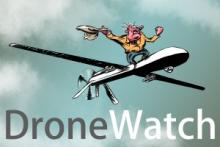
The Obama administration formally acknowledged this afternoon that four American citizens have been killed by drone strikes, one intentionally and three who were not targeted. The New York Times reports:
In a letter to Congressional leaders obtained by The New York Times, Attorney General Eric H. Holder Jr. disclosed that the administration had deliberately killed Anwar al-Awlaki, a radical Muslim cleric who was killed in a drone strike in September 2011 in Yemen.
The American responsibility for Mr. Awlaki’s death has been widely reported, but the administration had until now refused to confirm or deny it.
The letter also said that the United States had killed three other Americans: Samir Khan, who was killed in the same strike; Mr. Awlaki’s son Abdulrahman al-Awlaki, who was also killed in Yemen; and Jude Mohammed, who was killed in a strike in Pakistan.
“These individuals were not specifically targeted by the United States,” Mr. Holder wrote.
Read more here.
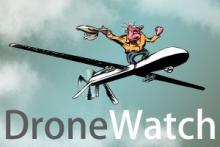
President Barack Obama will deliver a major speech on drone policy tomorrow. And for a number of reasons—including a smaller number of important al Qaeda targets, issues such as bad weather to diplomatic problems, and concerns about the costs and benefits—the number of drone strikes being carried out is dropping. The New York Times reports:
But lost in the contentious debate over the legality, morality and effectiveness of a novel weapon is the fact that the number of strikes has actually been in decline. Strikes in Pakistan peaked in 2010 and have fallen sharply since then; their pace in Yemen has slowed to half of last year’s rate; and no strike has been reported in Somalia for more than a year.
In a long-awaited address on Thursday at the National Defense University, Mr. Obama will make his most ambitious attempt to date to lay out his justification for the strikes and what they have achieved. He may follow up on public promises, including one he made in his State of the Union speech in February to define a “legal architecture” for choosing targets, possibly shifting more strikes from the C.I.A. to the military; explain how he believes that presidents should be “reined in” in their exercise of lethal power; and take steps to make a program veiled in secrecy more transparent.
Read more here.

In a letter sent to the White House and the leadership of key Congressional committees, Bishop Richard E. Pates of Des Moines, Iowa, chair of the U.S. Catholic Bishops’ Committee on International Justice and Peace, wrote that the use of drones in counter-terrorism “raises serious moral questions.”
Even when viewed through the prism of just war principles, the use of unmanned aerial vehicles (UAVs) for targeted killings raises serious moral questions. The Administration seems to have focused narrowly on the just cause of protecting citizens, but other elements of the tradition pose significant questions, including discrimination, imminence of the threat, proportionality and probability of success. Targeted killing should, by definition, be highly discriminatory. The Administration's policy appears to extend the use of deadly force to alleged "signature" attacks and reportedly classifies all males of a certain age as combatants. Are these policies morally defensible? They seem to violate the law of war, international human rights law, and moral norms.
He concludes by asking:
We understand the necessity for operational secrecy in counter-terrorism, but isn’t it critical to have a public discussion of the terms of the Administration’s policy of employing drones for targeted killings? Don’t the moral and strategic issues involved require broader discussion? Shouldn’t a policy with such wide potential consequences be subject to public scrutiny, at a minimum by representative institutions in a democratic society?
Read more here.
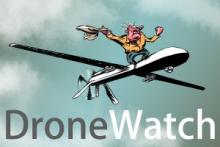
One of the ongoing discussions of the U.S. drone program is who should control it. Having it under the military provides more oversight and accountability; having it under the CIA provides more secrecy. The Obama administration has apparently decided to begin moving control of at least some drone operations to the military. Reuters reports:
Four U.S. government sources told Reuters that the decision had been made to shift the CIA's drone operations to the Pentagon, and some of them said it would occur in stages.
Drone strikes in Yemen, where the U.S. military already conducts operations with Yemeni forces, would be run by the armed forces, officials said.
But for the time-being U.S. drone strikes in Pakistan would continue to be conducted by the CIA to keep the program covert and maintain deniability for both the United States and Pakistan, several sources said.
Ultimately, however, the administration's goal would be to transfer the Pakistan drone operations to the military, one U.S. official said on condition of anonymity.
Read more here.
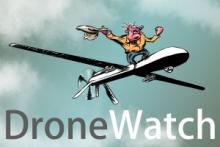
After nearly a month’s lull, two drone strikes were carried out in Yemen over the weekend, killing at least six suspected militants. Reuters reports:
Two suspected al Qaeda militants were killed on Monday in a drone strike on their vehicle south of the capital Sanaa, tribal and government sources said. The strike follows another on Saturday in which at least four militants were killed in Abyan governorate, in southernYemen.
Read more here.
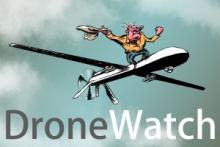
A high rate of burnout among drone pilots is leading to concerns in the U.S. Air Force over how they are selected. NBC News reports:
Pilots may be thousands of miles away from the flying weapons system they're operating. They often head home at the end of the day, as if returning from any other office job, maybe picking up milk on the way. But while at work, their drones' onboard cameras put them in a unique position to watch people being killed and injured as a direct result of their actions.
As psychologists learn more about the mental scarring warfare leaves on drone pilots — caused by long shift hours, isolation, witnessing casualties and those Jekyll-and-Hyde days split between battlefield and home — experts from within the U.S. Air Force are calling for a review of drone pilot selection.
Read more here.
